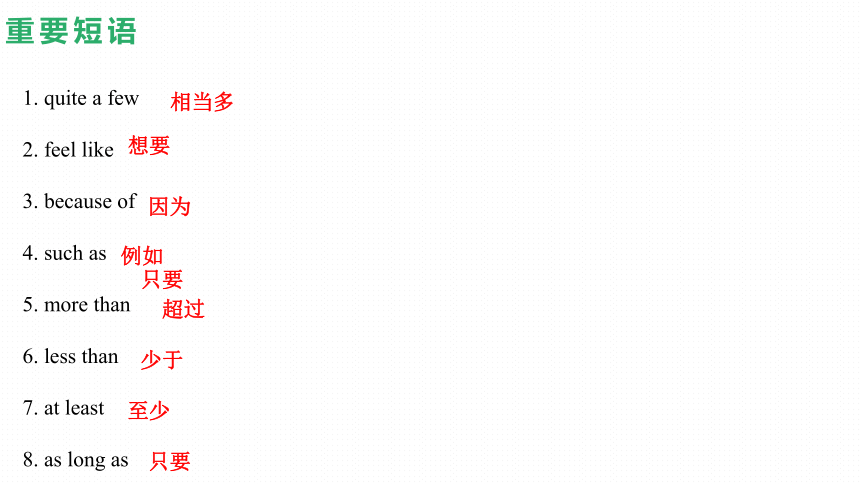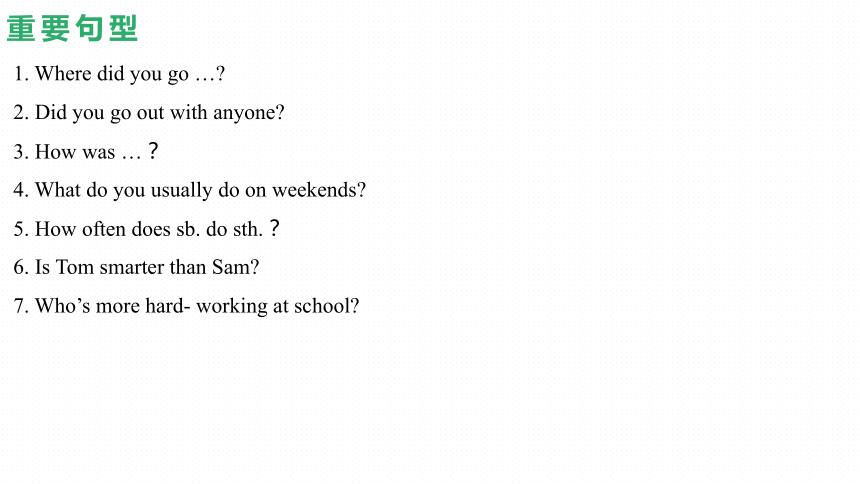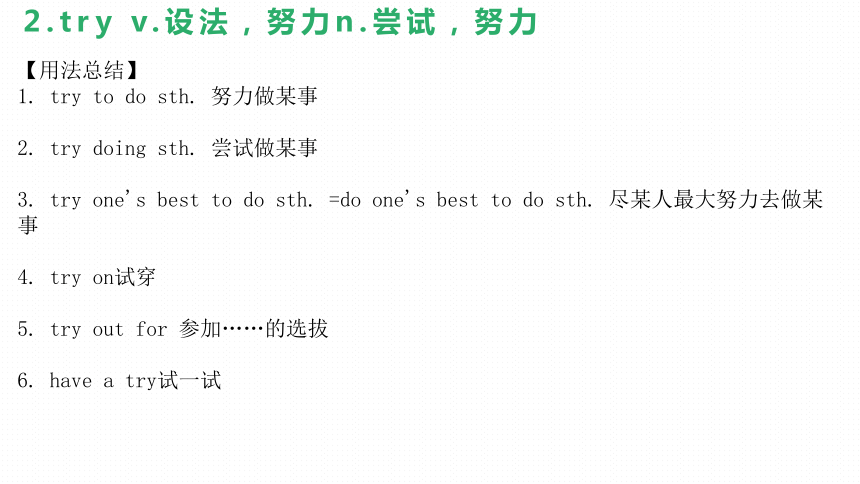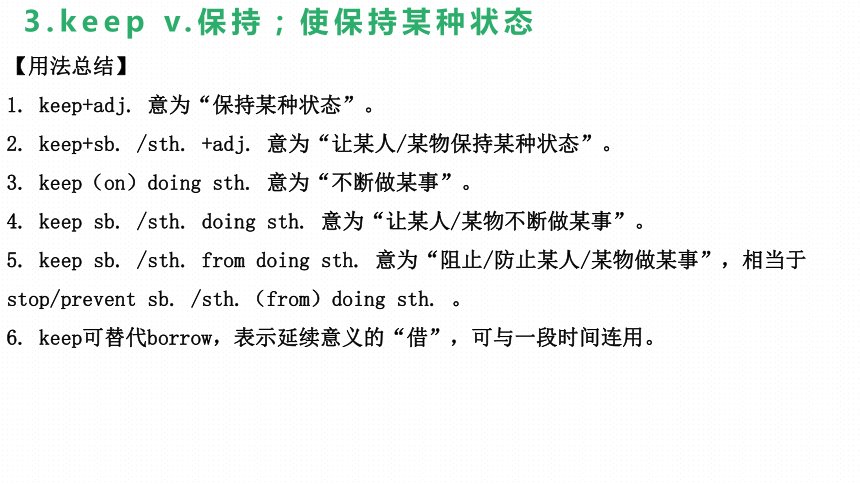中考第一轮复习人教新目标八年级英语上册Unit1-Unit3词汇短语复习课件
文档属性
| 名称 | 中考第一轮复习人教新目标八年级英语上册Unit1-Unit3词汇短语复习课件 |

|
|
| 格式 | pptx | ||
| 文件大小 | 198.0KB | ||
| 资源类型 | 试卷 | ||
| 版本资源 | 人教新目标(Go for it)版 | ||
| 科目 | 英语 | ||
| 更新时间 | 2025-02-14 00:00:00 | ||
图片预览












文档简介
(共35张PPT)
Unit 1-3
词汇短语复习
八年级
最新人教版
上
单元总复习
/ 让教学更有效 高效备考| 英语学科
1. quite a few
2. feel like
3. because of
4. such as
5. more than
6. less than
7. at least
8. as long as
重要短语
相当多
想要
因为
至少
少于
例如
超过
只要
只要
9. in fact
10. be different from
11. be similar to
12. the same as
13. bring out
14. care about
重要短语
实际上
与……相似
使……显现
与……不同
与……相同
关心
1. Where did you go …
2. Did you go out with anyone
3. How was …?
4. What do you usually do on weekends
5. How often does sb. do sth.?
6. Is Tom smarter than Sam
7. Who’s more hard- working at school
重要句型
Unit 1-3
语法汇集
八年级
最新人教版
下
/ 让教学更有效 高效备考| 英语学科
1.hardly adv.几乎不;几乎没有
辨析 hard/hardly
(1)hard :①作形容词时,意为“困难的(反义词easy);坚硬的(反义词soft)”。常见句型是“It's hard for sb. to do sth.”
②作副词时,意为“努力地;猛烈地;艰苦地”,作状语。
例如:The boy studies very hard. 这个男孩学习很刻苦。
Look! It is raining hard. 看!雨下得很大。
(2)hardly 频度副词,意为“几乎不”,hardly ever相当于almost not,本身含有否定的意思。反意疑问句的陈述部分含有hardly时,其疑问部分应该用肯定形式
小试牛刀
1.In my opinion, Tim studies ________ his sister.
A.not so hardly as B.as hardly as
C.as hard as D.not as hardly as
2.—How was the life in the mountain area
—Well, most people worked really ________, but they still lived a ________ life and could ________ pay for their children’s education.
A.hardly; hard; hardly B.hard; hard; hardly
C.hardly; hard; hardly D.hard; hardly; hardly
【答案】C;B
2.try v.设法,努力n.尝试,努力
【用法总结】
1. try to do sth. 努力做某事
2. try doing sth. 尝试做某事
3. try one's best to do sth. =do one's best to do sth. 尽某人最大努力去做某事
4. try on试穿
5. try out for 参加……的选拔
6. have a try试一试
小试牛刀
1.—Have you finished ________ the book
—Not yet. I’ll try ________ it to you before Friday.
A.reading; returning B.to read; to return
C.reading; to return D.to read; returning
2.— This pair of shoes looks ________ and ________ my trousers. May I ________
— OK, here you are.
A.well; match; try it on B.good; matches; try it on
C.nice; matches; try them on D.good; match; try on them
【答案】C;C
【用法总结】
1. keep+adj. 意为“保持某种状态”。
2. keep+sb. /sth. +adj. 意为“让某人/某物保持某种状态”。
3. keep(on)doing sth. 意为“不断做某事”。
4. keep sb. /sth. doing sth. 意为“让某人/某物不断做某事”。
5. keep sb. /sth. from doing sth. 意为“阻止/防止某人/某物做某事”,相当于stop/prevent sb. /sth.(from)doing sth. 。
6. keep可替代borrow,表示延续意义的“借”,可与一段时间连用。
3.keep v.保持;使保持某种状态
练一练
1.—We should keep children off electricity.
—Right. It’s dangerous.
A.cut ... off B.keep ... away from C.turn ... off
2.The best way for you to make your English better is to keep on speaking English every day.
A.to practice B.practicing C.practice D.practiced
【答案】B;B
辨析 how often/how long/how soon/how far/how many/how much
how often 多久一次 频率(sometimes;once a week)
how long ①物体长度(20meters long)
②时间段(since 1990;for 2 weeks)
how soon 多久之后 in+时间段(in 5days)
how far 多远 距离(10 minutes' walk)
how many 多少 可数名词的数量(two books)
how much ①不可数名词的量(a little)
②物品价格(5 yuan)
4.how often多久一次
练一练:
1.—________ do you have a class meeting
—Once a week.
A.How often B.How much C.What time D.How long
2.— ________ does it take you to go to school, John
—Only ten minutes.
A.How far B.How long C.How much D.How often
【答案】A;B
【用法总结】
1. send为及物动词,意为“发送,寄”。其过去式是sent。常用短语:send sb. sth. =send sth. to sb. “寄给某人某物”。
例如:Please don't send me junk e—mails.
请不要给我发垃圾电子邮件。
例如:My mother asked me to send them to my friend.
我妈妈让我将它们寄给我的朋友。
【拓展】和send有相同用法的动词还有show,lend,pass,give等。
2. send还意为“派遣”。send sb. to do sth. “派某人做某事”。
例如:We decided to send a doctor to help them.
5.send的用法
练一练:
1.— How many postcards ________ you ________ every year
— Only two.
A.is; sending B.are; sending C.does; send D.do; send
【答案】D
【用法总结】
leave作动词,意为“离开”。“leave for+地点”意为“前往某地”;“leave+地点+for+地点”意为“离开某地到另一地”。leave还可以表示“留下,遗忘,落下”。“leave sb. /sth. +介词+地点”意为“把某人/某物留在/落在某地”。
When did you leave home
你什么时候离开家的
When will you leave for Shanghai
你何时前往上海
I left my keys at home this morning.
6.leave的用法
练一练:
今天早上我将钥匙落在家里了。
1.Uncle John ________ London next week.
A.will leave to B.will leave for C.leaves to D.leaves for
2.—Please give the book back to me.
— Oh, I am sorry. I ______ to bring it here. I ______ it at home.
A.forget, forget B.forgot, left
C.forgotten, forget D.will forget, leave
【答案】B ;B
【用法总结】
1. enough既可作形容词,也可作副词,意为“足够的(地)”,修饰名词时常放在名词前,修饰形容词或副词时只能放在后面。
There's enough room for everybody.
这儿有足够大的空间,可以容纳每个人。
It's warm enough in the room.
房间里足够温暖。
2. 常见结构:形容词/副词+enough+to do sth. 足够……去做某事。
The boy is old enough to go to school.
这个男孩够大了,可以上学了。
She sings well enough to take part in the coming singing competition.
她唱得够好,可以去参加即将到来的歌唱比赛。
7.enough的用法
练一练
1.We have ________, so we must do our work ________.
A.enough time; careful enough B.time enough; carefully enough
C.time enough; enough carefully D.enough time; carefully enough
2.We don’t have ________ to buy this sweater, although the sweater is ________.
A.enough money;enough cheap B.money enough;expensive enough
C.money enough;enough cheap D.enough money;cheap enough
【答案】D ;D
【用法总结】
1. 表示“比……更……”用“形容词/副词比较级+than+比较成分”。
He is younger than me. 他比我年轻。
2. 表示“是……的几倍……”用“倍数+形容词/副词比较级+than+比较成分”。
This room is three times bigger than that one.
这个房间比那个房间大三倍。
3. 表示“两者之中较……的”,用“the+形容词比较级+of the two...”。
This one is the bigger of the two houses.
这座房子是两座房子中较大的那个。
4. 表示“越来越……”用“比较级+and+比较级”。
8.比较级的用法
5. 表示“越……,越……”用“the+比较级,the+比较级”。
The more, the better. 越多越好。
6. 表示“……和……更…… ”用“疑问词+be+形容词比较级,...or... ”或“疑问词+实义动词+副词比较级,...or... ”。
Which is bigger, the earth or the moon
哪一个更大,地球还是月球
7. 比较级可以被a little(一点),much(……得多),even(更加),still(更加),far(……得多)等修饰,但不可用very修饰。
现在的生活比20年前简单多了。
8. 用比较级的形式表示最高级的含义,结构为“比较级+than any other+可数名词单数”或“比较级+than the other+可数名词复数”。
8.比较级的用法
练一练:
1.The more exercise you take, ________ you will be.
A.healthier B.the healthiest
C.the healthier D.the weaker
2.This morning, Jack came to school ________ than ________ student in his class.
A.very later; any B.much later; any other
C.more later; any D.more later; any other
【答案】C;B
【用法总结】
1. neither 意为“两者都不”。neither of...作主语时,谓语动词用单复数均可。
Neither of the two boys is/are clever.
这两个男孩都不聪明。
温馨提示
neither...nor...“既不……也不……”,连接两个名词或代词作主语时,谓语动词的单复数遵循“就近”原则。
Neither students nor the teacher cleans the classroom.
学生和老师都没打扫教室。
2. none用作主语时,若指不可数名词,谓语动词用单数;若指可数名词,意为“(三者或三者以上)都不”,谓语动词可用单数(较正式),也可用复数(用于非正式文体,且更符合习惯用法)。
None of the money is mine. 这笔钱没有一分是我的。
None of the boys is/are clever. 这些男孩都不聪明。
9.neither/none/both/all/either
3. both意为“(两者)都”。both作主语时,谓语动词用复数。
He has two sons. Both of them are clever.
他有两个儿子。他们都聪明。
Both Jim and Tom are Americans.
吉姆和汤姆都是美国人。
4. all意为“(三者或三者以上)都”。all作主语时,谓语动词的单复数由all所修饰或指代的名词决定。
All of the students are there. 所有的学生都在那里。
5. either是“(两者中)任何一个”的意思。either...or...“或者……或者……;要么……要么…;不是……就是……”,通常用来连接两个并列的成分。连接两个并列主语时,谓语动词的单复数遵循“就近”原则。
You can park on either side of the street. 这条街两边都可停车。
练一练:
1.—Would you like some milk or juice
—________. Just some water, please.
A.Either B.Neither C.Both D.All
2.—Mark, do you want to buy the red sweater or the blue one
—I’ll buy ________ of them, so I can give one to my brother as a birthday gift.
A.all B.both C.either D.neither
【答案】B ;C
【用法总结】
1. as long as表示原因,意为“既然,由于,因为”,引导原因状语从句。
As long as you are going, I'll go too.
既然你要去,那么我也去。
2. as long as也可以表示条件,意为“只要”,引导条件状语从句。
As long as it doesn't rain, we can go.
只要不下雨,我们就可以去。
As long as there is life, there is hope.
只要有生命就有希望。
10.as long as的用法
练一练:
1.—I’m worrying about our English test these days.
—There is nothing to worry about ________ you work hard.
A.until B.so that C.as soon as D.as long as
2.—Michael was late for Mr. Smith’s class this morning.
—How come ________ I know, he never comes late for class.
A.As long as B.As soon as C.As far as
【答案】C ;C
【用法总结】
1.频率副词
频率副词按频率大小排列顺序为: always (一直) > usually (通常) > often (经常) > sometimes (有时) > hardly ever (几乎从不) > never (从不)。
2.表示频率的短语
表示具体的频率, 次数时, “ 一次” 用 once, “两次” 用 twice, 三次及三次以上用 “基数词 + times” 结构表示。 还有 every day, every week, every month 等
例 I visit my grandparents four times a year. 我一年去看望我祖父母4次。
3.对频率进行提问
对频率副词及表示频率的短语提问时用 how often, 意为 “多久一次”。
例 —How often do you go to the park 你多久去这个公园一次 — Twice a week. 一周两次。
11.表示频率的词
练一练:
1.—I can only play basketball once a week. How about you
—You are lucky. I ________ play basketball.
A.always B.usually C.often D.hardly ever
2.—How often does Tommy play basketball
—He says he ________ plays it because he does not like ball games.
A.sometimes B.usually C.often D.never
【答案】D;D
Unit 1-3
基础练习
八年级
最新人教版
上
/ 让教学更有效 高效备考| 英语学科
1.—________ is it from here to the Capital Airport
—About sixty kilometers.
A.How long B.How much C.How often D.How far
2.Lucy dances ________ any other student in her class, so we choose her to dance at the show.
A.worse than B.as badly as C.better than D.as beautiful as
3.“Write ________ and try not to make any mistakes,” the teacher said to her students.
A.as carefully as you can B.as careful as possible
C.more careful D.most carefully
4.— Which of the two dresses will you take
— I’ll take ________. One is for my cousin and the other is for my sister.
A.either B.both C.all D.neither
5.—There is ________ in the city. What about having a picnic in the countryside
—Good idea!
A.interesting something B.nothing interesting C.anything interesting
【答案】D;C;A;B;B
一、单项选择
二、阅读理解
When we interviewed what the life was like more than 70 years ago, many old soldiers were full of tears in their eyes. They told us that they never forgot those days when they were in the army, during which they lived hard lives but spared no effort to fight against the enemies.
Now in the year of 2015 comes the first great parade (阅兵) in the 21st century. September 3rd is the 70th anniversary (纪念) of the victory of the anti-Fascist war. This day is considered as an important moment for China, as well as the world. 49 countries from all over the world, including South Korea and eighteen European countries attended this special occasion.
In preparation for the parade, the soldiers worked hard every day. In order to walk well in the three hundred meters distance on the Tian’anmen Square, they had to receive extremely strict training. Each day, they got up early in the morning and started the 10 hours’ practice.
When a reporter arrived, it was raining heavily outside, but none of the soldiers stopped training. The reporter asked, “The training is so hard but why does nobody give up ” “It is the first time for me to join in such an important ceremony. I consider it a great honor. I must try my best.” one of the participants (参与者) answered. In fact, everyone takes pride in taking part in the big parade because they want to show the spirit of Chinese army, the power of Chinese army, as well as the determination keeping the world in peace.
From the soldiers, we learned the power of dreams. If one has a dream, he will get over any difficulty that get in the way to make the dream come true.
根据材料内容,选择最佳答案。
1.What did the old soldiers do more than 70 years ago
A.They took part in a war.B.They were full of tears.
C.They worked hard for the parade.D.They answered a reporter’s questions.
2.How many European countries took part in the parade
A.17. B.49. C.19. D.18.
3.Which of the following phrases can be described as the main idea of Paragraph3 A.A hard training. B.A good reporter.
C.The hot weather. D.The heavy rain.
4.According to the passage, the great parade took place in ________.
A.South Korea B.America C.China D.A European country
5.Which of the following is true
A.The training of the parade was usually on rainy day.
B.It was easy for the soldiers to perform well in the parade.
C.Quite many soldiers had taken part in the parade before.
D.The soldiers were tired but none of them would give up.
【答案】1.A 2.D 3.A 4.C 5.D
Thank you!
Unit 1-3
词汇短语复习
八年级
最新人教版
上
单元总复习
/ 让教学更有效 高效备考| 英语学科
1. quite a few
2. feel like
3. because of
4. such as
5. more than
6. less than
7. at least
8. as long as
重要短语
相当多
想要
因为
至少
少于
例如
超过
只要
只要
9. in fact
10. be different from
11. be similar to
12. the same as
13. bring out
14. care about
重要短语
实际上
与……相似
使……显现
与……不同
与……相同
关心
1. Where did you go …
2. Did you go out with anyone
3. How was …?
4. What do you usually do on weekends
5. How often does sb. do sth.?
6. Is Tom smarter than Sam
7. Who’s more hard- working at school
重要句型
Unit 1-3
语法汇集
八年级
最新人教版
下
/ 让教学更有效 高效备考| 英语学科
1.hardly adv.几乎不;几乎没有
辨析 hard/hardly
(1)hard :①作形容词时,意为“困难的(反义词easy);坚硬的(反义词soft)”。常见句型是“It's hard for sb. to do sth.”
②作副词时,意为“努力地;猛烈地;艰苦地”,作状语。
例如:The boy studies very hard. 这个男孩学习很刻苦。
Look! It is raining hard. 看!雨下得很大。
(2)hardly 频度副词,意为“几乎不”,hardly ever相当于almost not,本身含有否定的意思。反意疑问句的陈述部分含有hardly时,其疑问部分应该用肯定形式
小试牛刀
1.In my opinion, Tim studies ________ his sister.
A.not so hardly as B.as hardly as
C.as hard as D.not as hardly as
2.—How was the life in the mountain area
—Well, most people worked really ________, but they still lived a ________ life and could ________ pay for their children’s education.
A.hardly; hard; hardly B.hard; hard; hardly
C.hardly; hard; hardly D.hard; hardly; hardly
【答案】C;B
2.try v.设法,努力n.尝试,努力
【用法总结】
1. try to do sth. 努力做某事
2. try doing sth. 尝试做某事
3. try one's best to do sth. =do one's best to do sth. 尽某人最大努力去做某事
4. try on试穿
5. try out for 参加……的选拔
6. have a try试一试
小试牛刀
1.—Have you finished ________ the book
—Not yet. I’ll try ________ it to you before Friday.
A.reading; returning B.to read; to return
C.reading; to return D.to read; returning
2.— This pair of shoes looks ________ and ________ my trousers. May I ________
— OK, here you are.
A.well; match; try it on B.good; matches; try it on
C.nice; matches; try them on D.good; match; try on them
【答案】C;C
【用法总结】
1. keep+adj. 意为“保持某种状态”。
2. keep+sb. /sth. +adj. 意为“让某人/某物保持某种状态”。
3. keep(on)doing sth. 意为“不断做某事”。
4. keep sb. /sth. doing sth. 意为“让某人/某物不断做某事”。
5. keep sb. /sth. from doing sth. 意为“阻止/防止某人/某物做某事”,相当于stop/prevent sb. /sth.(from)doing sth. 。
6. keep可替代borrow,表示延续意义的“借”,可与一段时间连用。
3.keep v.保持;使保持某种状态
练一练
1.—We should keep children off electricity.
—Right. It’s dangerous.
A.cut ... off B.keep ... away from C.turn ... off
2.The best way for you to make your English better is to keep on speaking English every day.
A.to practice B.practicing C.practice D.practiced
【答案】B;B
辨析 how often/how long/how soon/how far/how many/how much
how often 多久一次 频率(sometimes;once a week)
how long ①物体长度(20meters long)
②时间段(since 1990;for 2 weeks)
how soon 多久之后 in+时间段(in 5days)
how far 多远 距离(10 minutes' walk)
how many 多少 可数名词的数量(two books)
how much ①不可数名词的量(a little)
②物品价格(5 yuan)
4.how often多久一次
练一练:
1.—________ do you have a class meeting
—Once a week.
A.How often B.How much C.What time D.How long
2.— ________ does it take you to go to school, John
—Only ten minutes.
A.How far B.How long C.How much D.How often
【答案】A;B
【用法总结】
1. send为及物动词,意为“发送,寄”。其过去式是sent。常用短语:send sb. sth. =send sth. to sb. “寄给某人某物”。
例如:Please don't send me junk e—mails.
请不要给我发垃圾电子邮件。
例如:My mother asked me to send them to my friend.
我妈妈让我将它们寄给我的朋友。
【拓展】和send有相同用法的动词还有show,lend,pass,give等。
2. send还意为“派遣”。send sb. to do sth. “派某人做某事”。
例如:We decided to send a doctor to help them.
5.send的用法
练一练:
1.— How many postcards ________ you ________ every year
— Only two.
A.is; sending B.are; sending C.does; send D.do; send
【答案】D
【用法总结】
leave作动词,意为“离开”。“leave for+地点”意为“前往某地”;“leave+地点+for+地点”意为“离开某地到另一地”。leave还可以表示“留下,遗忘,落下”。“leave sb. /sth. +介词+地点”意为“把某人/某物留在/落在某地”。
When did you leave home
你什么时候离开家的
When will you leave for Shanghai
你何时前往上海
I left my keys at home this morning.
6.leave的用法
练一练:
今天早上我将钥匙落在家里了。
1.Uncle John ________ London next week.
A.will leave to B.will leave for C.leaves to D.leaves for
2.—Please give the book back to me.
— Oh, I am sorry. I ______ to bring it here. I ______ it at home.
A.forget, forget B.forgot, left
C.forgotten, forget D.will forget, leave
【答案】B ;B
【用法总结】
1. enough既可作形容词,也可作副词,意为“足够的(地)”,修饰名词时常放在名词前,修饰形容词或副词时只能放在后面。
There's enough room for everybody.
这儿有足够大的空间,可以容纳每个人。
It's warm enough in the room.
房间里足够温暖。
2. 常见结构:形容词/副词+enough+to do sth. 足够……去做某事。
The boy is old enough to go to school.
这个男孩够大了,可以上学了。
She sings well enough to take part in the coming singing competition.
她唱得够好,可以去参加即将到来的歌唱比赛。
7.enough的用法
练一练
1.We have ________, so we must do our work ________.
A.enough time; careful enough B.time enough; carefully enough
C.time enough; enough carefully D.enough time; carefully enough
2.We don’t have ________ to buy this sweater, although the sweater is ________.
A.enough money;enough cheap B.money enough;expensive enough
C.money enough;enough cheap D.enough money;cheap enough
【答案】D ;D
【用法总结】
1. 表示“比……更……”用“形容词/副词比较级+than+比较成分”。
He is younger than me. 他比我年轻。
2. 表示“是……的几倍……”用“倍数+形容词/副词比较级+than+比较成分”。
This room is three times bigger than that one.
这个房间比那个房间大三倍。
3. 表示“两者之中较……的”,用“the+形容词比较级+of the two...”。
This one is the bigger of the two houses.
这座房子是两座房子中较大的那个。
4. 表示“越来越……”用“比较级+and+比较级”。
8.比较级的用法
5. 表示“越……,越……”用“the+比较级,the+比较级”。
The more, the better. 越多越好。
6. 表示“……和……更…… ”用“疑问词+be+形容词比较级,...or... ”或“疑问词+实义动词+副词比较级,...or... ”。
Which is bigger, the earth or the moon
哪一个更大,地球还是月球
7. 比较级可以被a little(一点),much(……得多),even(更加),still(更加),far(……得多)等修饰,但不可用very修饰。
现在的生活比20年前简单多了。
8. 用比较级的形式表示最高级的含义,结构为“比较级+than any other+可数名词单数”或“比较级+than the other+可数名词复数”。
8.比较级的用法
练一练:
1.The more exercise you take, ________ you will be.
A.healthier B.the healthiest
C.the healthier D.the weaker
2.This morning, Jack came to school ________ than ________ student in his class.
A.very later; any B.much later; any other
C.more later; any D.more later; any other
【答案】C;B
【用法总结】
1. neither 意为“两者都不”。neither of...作主语时,谓语动词用单复数均可。
Neither of the two boys is/are clever.
这两个男孩都不聪明。
温馨提示
neither...nor...“既不……也不……”,连接两个名词或代词作主语时,谓语动词的单复数遵循“就近”原则。
Neither students nor the teacher cleans the classroom.
学生和老师都没打扫教室。
2. none用作主语时,若指不可数名词,谓语动词用单数;若指可数名词,意为“(三者或三者以上)都不”,谓语动词可用单数(较正式),也可用复数(用于非正式文体,且更符合习惯用法)。
None of the money is mine. 这笔钱没有一分是我的。
None of the boys is/are clever. 这些男孩都不聪明。
9.neither/none/both/all/either
3. both意为“(两者)都”。both作主语时,谓语动词用复数。
He has two sons. Both of them are clever.
他有两个儿子。他们都聪明。
Both Jim and Tom are Americans.
吉姆和汤姆都是美国人。
4. all意为“(三者或三者以上)都”。all作主语时,谓语动词的单复数由all所修饰或指代的名词决定。
All of the students are there. 所有的学生都在那里。
5. either是“(两者中)任何一个”的意思。either...or...“或者……或者……;要么……要么…;不是……就是……”,通常用来连接两个并列的成分。连接两个并列主语时,谓语动词的单复数遵循“就近”原则。
You can park on either side of the street. 这条街两边都可停车。
练一练:
1.—Would you like some milk or juice
—________. Just some water, please.
A.Either B.Neither C.Both D.All
2.—Mark, do you want to buy the red sweater or the blue one
—I’ll buy ________ of them, so I can give one to my brother as a birthday gift.
A.all B.both C.either D.neither
【答案】B ;C
【用法总结】
1. as long as表示原因,意为“既然,由于,因为”,引导原因状语从句。
As long as you are going, I'll go too.
既然你要去,那么我也去。
2. as long as也可以表示条件,意为“只要”,引导条件状语从句。
As long as it doesn't rain, we can go.
只要不下雨,我们就可以去。
As long as there is life, there is hope.
只要有生命就有希望。
10.as long as的用法
练一练:
1.—I’m worrying about our English test these days.
—There is nothing to worry about ________ you work hard.
A.until B.so that C.as soon as D.as long as
2.—Michael was late for Mr. Smith’s class this morning.
—How come ________ I know, he never comes late for class.
A.As long as B.As soon as C.As far as
【答案】C ;C
【用法总结】
1.频率副词
频率副词按频率大小排列顺序为: always (一直) > usually (通常) > often (经常) > sometimes (有时) > hardly ever (几乎从不) > never (从不)。
2.表示频率的短语
表示具体的频率, 次数时, “ 一次” 用 once, “两次” 用 twice, 三次及三次以上用 “基数词 + times” 结构表示。 还有 every day, every week, every month 等
例 I visit my grandparents four times a year. 我一年去看望我祖父母4次。
3.对频率进行提问
对频率副词及表示频率的短语提问时用 how often, 意为 “多久一次”。
例 —How often do you go to the park 你多久去这个公园一次 — Twice a week. 一周两次。
11.表示频率的词
练一练:
1.—I can only play basketball once a week. How about you
—You are lucky. I ________ play basketball.
A.always B.usually C.often D.hardly ever
2.—How often does Tommy play basketball
—He says he ________ plays it because he does not like ball games.
A.sometimes B.usually C.often D.never
【答案】D;D
Unit 1-3
基础练习
八年级
最新人教版
上
/ 让教学更有效 高效备考| 英语学科
1.—________ is it from here to the Capital Airport
—About sixty kilometers.
A.How long B.How much C.How often D.How far
2.Lucy dances ________ any other student in her class, so we choose her to dance at the show.
A.worse than B.as badly as C.better than D.as beautiful as
3.“Write ________ and try not to make any mistakes,” the teacher said to her students.
A.as carefully as you can B.as careful as possible
C.more careful D.most carefully
4.— Which of the two dresses will you take
— I’ll take ________. One is for my cousin and the other is for my sister.
A.either B.both C.all D.neither
5.—There is ________ in the city. What about having a picnic in the countryside
—Good idea!
A.interesting something B.nothing interesting C.anything interesting
【答案】D;C;A;B;B
一、单项选择
二、阅读理解
When we interviewed what the life was like more than 70 years ago, many old soldiers were full of tears in their eyes. They told us that they never forgot those days when they were in the army, during which they lived hard lives but spared no effort to fight against the enemies.
Now in the year of 2015 comes the first great parade (阅兵) in the 21st century. September 3rd is the 70th anniversary (纪念) of the victory of the anti-Fascist war. This day is considered as an important moment for China, as well as the world. 49 countries from all over the world, including South Korea and eighteen European countries attended this special occasion.
In preparation for the parade, the soldiers worked hard every day. In order to walk well in the three hundred meters distance on the Tian’anmen Square, they had to receive extremely strict training. Each day, they got up early in the morning and started the 10 hours’ practice.
When a reporter arrived, it was raining heavily outside, but none of the soldiers stopped training. The reporter asked, “The training is so hard but why does nobody give up ” “It is the first time for me to join in such an important ceremony. I consider it a great honor. I must try my best.” one of the participants (参与者) answered. In fact, everyone takes pride in taking part in the big parade because they want to show the spirit of Chinese army, the power of Chinese army, as well as the determination keeping the world in peace.
From the soldiers, we learned the power of dreams. If one has a dream, he will get over any difficulty that get in the way to make the dream come true.
根据材料内容,选择最佳答案。
1.What did the old soldiers do more than 70 years ago
A.They took part in a war.B.They were full of tears.
C.They worked hard for the parade.D.They answered a reporter’s questions.
2.How many European countries took part in the parade
A.17. B.49. C.19. D.18.
3.Which of the following phrases can be described as the main idea of Paragraph3 A.A hard training. B.A good reporter.
C.The hot weather. D.The heavy rain.
4.According to the passage, the great parade took place in ________.
A.South Korea B.America C.China D.A European country
5.Which of the following is true
A.The training of the parade was usually on rainy day.
B.It was easy for the soldiers to perform well in the parade.
C.Quite many soldiers had taken part in the parade before.
D.The soldiers were tired but none of them would give up.
【答案】1.A 2.D 3.A 4.C 5.D
Thank you!
